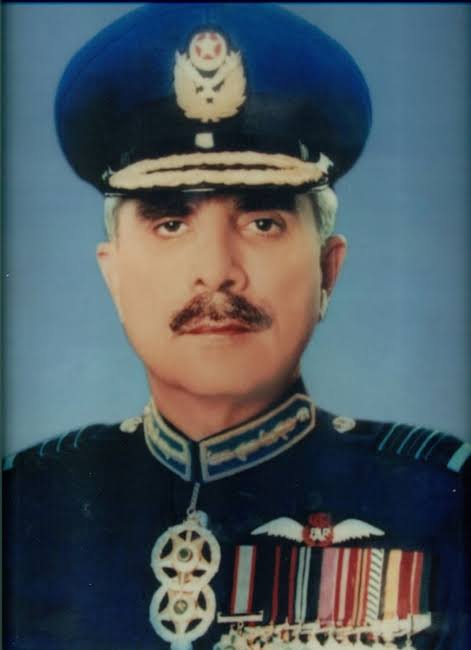An officer respected by his juniors and a junior well-liked by his seniors, a comrade with a wonderful sense of humor, an agile athlete, and a Chief who led the Pakistan Air Force through a most difficult period, late Air Chief Marshal Farooq Feroze Khan was a man revered by all. He served as Chief of the Air Staff, Pakistan Air Force from 9 March 1991 to 8 November 1994, among many other prestigious posts.
An outstanding individual in all aspects, Khan was born in Bombay (Mumbai) British India, but migrated to Pakistan with his family at the age of eight after partition. His father, Feroze Khan Sr., was a professional hockey player and won the gold medal for India during the 1928 Olympics. After migration, he represented Pakistan at international field hockey games for the rest of his career.
Farooq Feroze received his early education from Karachi and passed his Senior Cambridge exams from Pakistan Air Force College, Sargodha. He was one of the few cadets who was selected for US Air Force Academy, Colorado. He was commissioned as a pilot officer into the PAF’s No. 9 Squadron called Griffins in 1959.
During his professional career, Khan flew a total of 2,500 flight hours without a single accident; holding an unblemished record of fighter flying. He was awarded four consecutive Green Endorsements for accident-free flying.
ACM Khan had diverse leadership qualities. He had the ability to understand a difficult situation instantly. This clarity of thought rendered him the ability to judge and make decisions quickly, and turn around even the most volatile situations. This leadership quality helped him reach the highest positions in the military.
He was a veteran of both the 1965 and 1971 wars with India. During the 1965 War, PAF had only one squadron deployed in East Pakistan against a number of Indian Air Force’s (IAF) operational squadrons. Farooq Feroze Khan was part of No. 14 Squadron as a Flight Lieutenant. Against all odds, 14 Squadron set out to attack Indian Air Base Kalaikunda on the fateful morning of 7th September. The Squadron succeeded in wreaking havoc on the base and damaged as well as completely destroyed 21 Canberra bombers, Hawker Hunters as well as a C-119 aircraft of the Indian air fleet. The squadron later came to be known as ‘Tail Choppers’ because it essentially chopped the tail off of IAF in that attack.
Afterwards, from 1977 to 1980, Farooq Feroze commanded a United Arab Emirates Air Force’s Fighter Wing. Due to his outstanding managerial skills, he was also selected by then-Prime Minister Benazir Bhutto for reforming the Pakistan International Airlines, just before he was appointed as Chief of Air Staff.
In 1991, he was given command of the PAF. This was a time when Pakistan was facing its most difficult diplomatic and economic crisis. The United States had placed sweeping military and economic sanctions on Pakistan. Washington had also indefinitely delayed the provision of F-16 jets to PAF, for which Pakistan had already made payments. This naturally caused alarm in the PAF which was mostly structured on US-built systems. This created the need to move forward in an innovative way to keep PAF’s combat structure functional. Since Farooq Feroze Khan was known to have his finger on the pulse of the Air Force, he immediately sensed the gravity of the issue.
It was under his leadership that PAF laid the ground for initiating Project ROSE (Retrofit Of Strike Element) to increase self-reliance. The Project oversaw the smooth induction of 42 Mirage-III fighter planes from Australia. The program also sought to upgrade avionics and electronic systems of the Mirage-III jets. Most of these jets were built in France and were procured by Pakistan in the late 1960s. Project ROSE was a success and saved PAF a huge amount of foreign exchange. Moreover, CAS Khan also actively sought to keep the fleet war-worthy by saving on flying hours. He was known to easily maneuver around difficult things and solving them with effortless ease and a smile on his face. His years as Chief proved his mettle and proactive leadership style.
After his tenure as ACM, Farooq Feroze was appointed as Chairman Joint Chiefs of Staff Committee (CJCSC) for three years (1994-97). In the history of Pakistan’s Armed Forces, he has been the only officer from PAF who has ever been appointed as CJCSC. He also happens to be the only PAF officer with over 40 years’ experience.
For epitomizing professional excellence and courage, Farooq Feroze Khan was awarded Sitara-i-Bisalat in 1971, Sitara-i-Imtiaz in 1985, Hilal-i-Imtiaz in 1989, and Nishan-i-Imtiaz in 1991.
Even after his retirement, the former ACM remained on his toes to reciprocate the respect and opportunities that the nation had accorded him. He established the Sargodhian Spirit Trust ‘with the objective of establishing educational centres of excellence in all provinces of Pakistan’, particularly in the backward areas to give the less privileged but equally intelligent and skilled students an opportunity to receive quality education. So far, four such institutes have been established – two in Sindh; one in Khyber Pakhtunkhwa; and one in Balochistan.
The list of Air Chief Marshal Farooq Feroze Khan’s accomplishments is long and cannot be covered in one article. The nation remains forever in his debt. The Air Chief breathed his last on 9 October 2021. May his soul rest in peace and his legacy continue to live on in PAF forever.
The author is a Researcher at the Centre for Aerospace & Security Studies (CASS), Islamabad, Pakistan. The tribute was first published in National Herald Tribune. She can be reached at [email protected]
Image Source: https://twitter.com/DGPR_PAF/status/1446938614538063876?s=20





